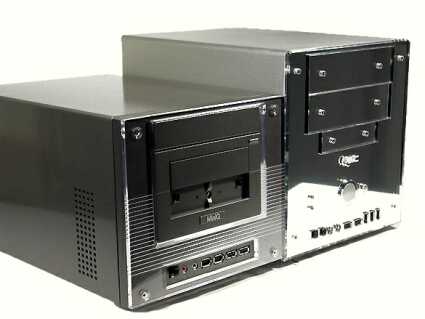Battle of the Minis: Soltek vs. Shuttle
Conclusion: High Performance But Noisy At Increased Capacity
Soltek's QBic barebone system competes directly with the well-known XPC series from Shuttle and is available in two different configurations: the smaller version, the EQ 2000, and the model we tested, the EQ3000, with a larger case that falls just short of an ATX form factor mini tower. The larger model is the better choice, as its larger internal volume means that heat build-up from internal components is less of a problem. It also has the advantage over the old series of Shuttle PCs, which became relatively hot in our lab test. Soltek provides a case fan for cooling, although it generates a lot of noise in combination with the other four fans (CPU, chipset, power supply and optional GeForce 4 Ti 4600 graphics card). Activating "silent mode" in the BIOS does little to help. All things considered, they develop less heat than the old Shuttle systems, but at the expense of higher noise levels.
The quality of workmanship for the Soltek system is not quite as high as that of the well-known Shuttle systems. On our machine, this was reflected in the sticking reset button and the cheap looking power switch. Even the mirror front panel is not everyone's cup of tea, as dust is attracted electrostatically and fingerprints can easily spoil the pristine appearance.
The most impressive thing about the Soltek PC was its performance. Fitted with a 3 GHz P4, 512 MB DDR333 and a GeForce 4 Ti 4600 graphics card, it delivers higher performance than most of today's ready-built systems. The benchmark results place the Soltek and the Shuttle SB51G (also with Intel 845GE chipset) neck and neck. The PC buyer must ultimately decide what additional hardware to install. We decided from the outset to go for the ultimate configuration. It is worth pointing out here that NVIDIA's latest creation, the GeForce FX family, does not work with the Soltek system because there is no free PCI slot available to the left of the AGP slot. We would strongly advise against fitting two hard disks close together. The heat generated by fast 7200-rpm hard drives is almost certain to cause problems.
The revolution has already started. In the medium term, conventional desktop systems will disappear from the market, to be replaced by high-performance laptops and mini systems with new form factors.
Already in the pipeline: the new mini system from Jetway is already in our labs in Munich.
Soltek is now entering the market that Shuttle previously had all to itself. But competition is good for consumers, and a wider range of available products will benefit the PC buyer.
Get Tom's Hardware's best news and in-depth reviews, straight to your inbox.
Current page: Conclusion: High Performance But Noisy At Increased Capacity
Prev Page Office/ Internet Performance: Sysmark 2002